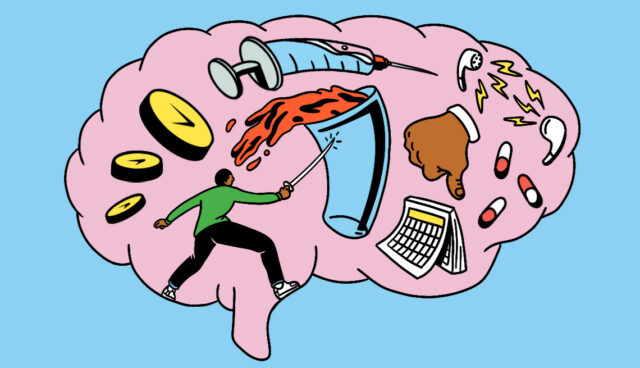
If you’re someone who struggles with mental health, you’ll know some days seem more difficult than others. These are what many people call ‘bad brain days.’ It’s kind of like when you feel foggy or maybe more downcast than normal.
These days can feel especially hard to deal with sometimes. If you have a lot of work on your plate or are a parent, it can be a struggle. However, you don’t need to let a bad brain day get in your way. Show your mental health who’s boss and take control back. Here are six methods to use when the usual just aren’t quite cutting it.
1. Make Sure You’re Getting Treatment
If you’re not already taking action to prioritize your mental health, it would be wise to start as soon as possible. Your mental well-being should be a top priority in your life. It’s just as important, if not more important, than your physical health.
There are multiple ways to seek help when it comes to your mental health, and there are a variety of approaches. Therapy is a good, starting option that everyone can benefit from. Being able to talk to a licensed professional about your struggles can take a load off your shoulders. They’re trained to be able to help you through difficulties and curate ways to manage your anxiety.
If therapy isn’t providing enough relief from your mental health struggles, mental health treatment may be an option. Medications can offer an additional lifeline to those who continue to struggle with their mental health. Certain medications increase the levels of serotonin in your brain, causing many to feel happier overall. However, it’s important to consult with a healthcare provider to determine which treatment is appropriate. Visit here to learn more about those options.
2. Try Yoga or Meditation

If your bad brain day includes fogginess or trouble focusing, using relaxation techniques can help. Yoga and meditation are two common activities that many people use to calm their minds.
When it comes to yoga, you don’t need to join a class if you don’t want to. Doing some simple yoga poses at home can do the trick. The internet is full of information, luckily, and you can find tutorials to follow along with. There are even simple poses you can do while sitting in a chair if you don’t have time for a full yoga session.
Meditation doesn’t have to be a religious experience, either, if you don’t want it to be. Meditation is simply for relaxing the mind and sharpening your focus. Employing this technique can help ease your anxiety in stressful situations. Just think about one happy thought and stick with it while taking deep breaths. It can be that simple, and it helps.
3. Take a Nap
Sometimes all your brain needs is a little rest to feel refreshed. If you feel like nothing you do can help you focus or feel better, consider getting a little shut-eye. Even a short nap can make a difference. Just 30 minutes can be enough to help you feel a little more like yourself.
The Sleep Foundation recommends napping no longer than 30 minutes at a time. This is the amount of sleep necessary to wake up just before hitting the REM cycle, which is deep sleep. Light sleep is better for naps because it boosts alertness. Getting into a deep sleep for a shorter period than the usual seven to eight hours at night can make you feel even groggier. So make sure you set your alarm1
4. Try Grounding Practices

You might be in a situation where you can’t take much of a break. If you’re at work or in a class, it can seem like a more difficult task to relax. However, one technique, called grounding, is a quick and easy way to refocus and calm your brain.
Grounding works by making you aware of what’s around you. One common way to ground yourself is by using the ‘five things’ method. You think about certain items in an order like this:
- Five things you can see
- Four things you can feel
- Three things you can hear
- Two things you can smell
- One thing you can taste
This technique engages all five senses to acutely focus your mind. And, it’s one where you don’t have to move around. No one will even know you’re doing it because it’s all in your head. This makes calming down more discreet in a public situation.
5. Recite Positive Affirmations
It’s easy to get into an even worse mindset when you’re already not feeling your best. Those guilty thoughts might come around, shaming you for not being able to focus. In these situations, it’s important to remind yourself that these things happen and that it’s okay.

Positive affirmations are usually short phrases with powerful positivity. Some common ones are “I am strong, and I can do this,” or “I am worthy of what I desire.” Repeating these sentences to yourself can help reinforce positive thinking. Plus, they’ll remind you that your struggles are part of the human experience and that you’re not alone.
6. Try the Pomodoro Method
If your bad brain day has poor timing and you have a lot to do, you might feel overwhelmed. Trying to focus and stay on-task is usually more difficult in these situations. Luckily, there are focusing techniques designed to combat this.
The Pomodoro method is an approach to working or studying that involves timed, on-and-off sessions. First, work in 25- or 30-minute intervals. After a session of work is done, you take two- or three-minute breaks, then get back to work. Additionally, after four working sessions, allow yourself to take breaks that are a bit longer, like 10 minutes.
Be Kind to Yourself
Having a bad brain day is an unfortunate part of being human. It can feel especially difficult if mental health is a subject you struggle with. It’s important to remember that through it all, you’re not to blame.
Giving yourself some grace during these days is necessary for your mental well-being. Chastising yourself will only make you feel worse. Guilt is never the way to go when it comes to mental health. So be easy on yourself. It is possible to be strong even on the darkest of days.













